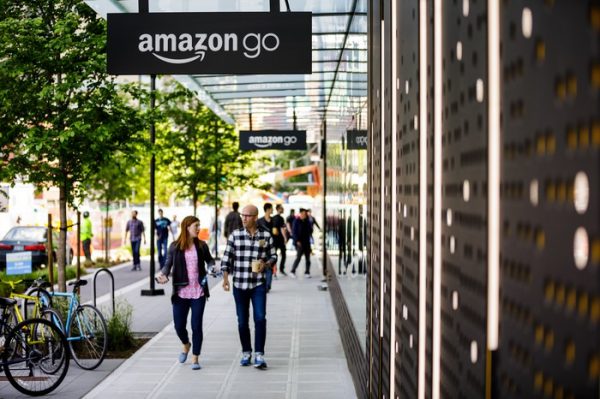Amazon Is Trying to License Its Cashierless Technology to Some Retail Giants – Motley Fool
News broke last week that Amazon (NASDAQ:AMZN) plans to license its game-changing Amazon Go cashierless store technology to other retailers. Then on Sunday, reports came out that Amazon has been in talks with Walmart (NYSE:WMT) and Target (NYSE:TGT) to license the technology. The word is those retailers aren’t interested at this point, but that could change. Word is also out that some other retailers have signed on already.
What is Amazon Go?
Amazon Go is the company’s physical retail store concept that utilizes various technologies like cameras, computer vision, deep learning algorithms, sensor fusion, and others to create a unique shopping experience.
The first several Amazon Go stores were small convenience stores. To gain access to the stores, customers scan the Amazon Go app on their smartphones on the turnstile sensor. From there, they can shop as they normally would, grabbing anything off the shelves. Instead of going to a checkout counter and waiting in line, though, they simply walk out. The technology hidden in the ceilings, shelves, and elsewhere knows exactly what the customer took, charges the person’s Amazon account, and emails the invoice moments later.
There are now 26 Amazon Go stores around the U.S., including its first larger-scale grocery store that just opened in Seattle last month.

Image source: Amazon.
Amazon has options for implementing Go services
Amazon Go technology gives the company several good options for potential growth. It could roll out a few thousand convenience stores around the country, as it was rumored to have plans to do not long ago. It could start a chain of large-scale grocery stores like the first one it opened in Seattle last month. It could use the technology to compete in almost any other retail category as well, for that matter. It may do all of the above.
But Amazon licensing the technology to other retailers, potentially even Walmart and/or Target, is a huge deal. No matter how many of its own physical stores Amazon opens with this technology, there will always be so many more non-Amazon retail stores out there. By licensing it, Amazon is basically offering its technology as a service to others.
This is not very different from how Amazon Web Services (AWS), its public cloud business, was originally started: as a solution to the company’s internal computing needs, that only later was rolled out as a service to other businesses. Essentially, Amazon would be leveraging the research and development investments it has made in the past to get a piece of other retailers’ sales.
Could this be Amazon’s fourth pillar?
If Amazon licenses this technology to retailers, the retailers that adopt it will have the potential to create a better customer experience with no checkout lines. They are also likely to have a cost advantage over their peers because the technology facilitates the reduction of staffing levels. That would let those retailers either improve profits or, more likely, let them offer lower prices for customers, which could increase their market share. Eventually, Amazon’s technology (or a similar technology offered by another company) could become table stakes just to have a chance to compete in physical retail at all.
According to The Wall Street Journal, Walmart and Target are still in talks with Amazon but are unlikely to sign on. Retailers have been understandably cautious about partnering with Amazon considering it is widely seen as a disrupter and as a direct competitor. Walmart has even encouraged its vendors to use a different public cloud provider than AWS so they do not serve to strengthen its largest competitor.
But “several” retailers have signed up for Amazon’s technology, which is being marketed as “Just Walk Out” technology, so far. The company hasn’t named all its clientele yet, but one partner is OTG Management, which operates airport stores at New York’s La Guardia Airport and New Jersey’s Newark Liberty International Airport. OTG’s agreement with Amazon stipulates that only OTG has access to the retail store data the service will generate, which is probably important to almost any retailer thinking of partnering with Amazon.
Over time, Amazon Go technology has the potential to be a big business for Amazon. One day, the company could have several thousand of its own Amazon Go physical stores in a variety of formats as well as a lucrative licensing revenue stream from retailers who sign up to partner with the company. Investors wondering what might form Amazon’s fourth pillar of its business should take notice of these developments.






